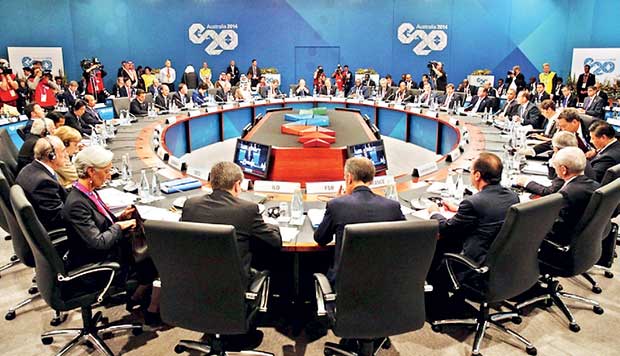10 Jul 2017 - {{hitsCtrl.values.hits}}

Putin Trump handshake became the key photo moment a t the G20 summit held in Hamburg, Germany. A new cease fire in Syria, brokered by Jordan, United States and Russia was announced as a means to argue that the meeting between the two leaders generated a positive outcome. Apart from opaque terms describing the ceasefire agreement that came out of the meeting nothing substantial was revealed. Liberal and conservative media pundits in the United States provided extremely contradicting spins to the meeting. The summit clearly represented a major divide of opinion on how to shape the future of the global trading agenda; a development that concerns the rest of the world.
The G 20, a mere informal grouping of heads of central banks that was set up in the aftermath of Asian financial crises became a head of State affair in the aftermath of the crash of the Lehman brothers in 2008 which led to the 2008 financial crises leaving a trail of political and economic  upheavals that are creating major crises globally. From populist political movements, mass political protests, attacks on the liberal economic project and the crises of political democracy are all symptoms of this metastasise in the global order. Yet when the group that represents nearly 85% of the global GDP and a 2/3 of all humanity, when a fault line appears on the global trading lifelines that should be a focus on concern
upheavals that are creating major crises globally. From populist political movements, mass political protests, attacks on the liberal economic project and the crises of political democracy are all symptoms of this metastasise in the global order. Yet when the group that represents nearly 85% of the global GDP and a 2/3 of all humanity, when a fault line appears on the global trading lifelines that should be a focus on concern
The recent global political developments since the last summit which was held in China in 2016 seem to have rattled global political leaders across the board. From Trump to May and to the radical left which was protesting in Hamburg is a sign that the global multi lateral liberal economic order is stalling and in crisis mode. Making American and British leaders to believe in a more regulated, closed and nationalist trading agenda which pitted them against the EU leadership, German Chancellor, President Xi Jingping of China, Russian President Putin to the Japanese Prime Minister who represented a unified front of continuous support for the globalist agenda of deepening and widening international trade and creating more trading opportunities and easing trade barriers.
The Trump-Putin handshake may represent some kind of a détente or a symbolic move to thwart any cold war between the two countries, Trump’s and Putin’s global agenda represents a pure antithesis. While Trump’s ‘make America great’ slogan doubles a vague policy statement calls for more protectionism across the board and his administration’s pull out of Paris Climate agreement does represent an end to American interest in global governance. Yet Putin in the build up to the Summit clearly acknowledged that he was looking forward to meeting up with Trump.
Putin’s statements in the sidelines of the G20 summit in a meeting with BRICS leaders went under-reported, where he commented about Russia’s position on global trade and climate change. Where he  said: ‘We oppose the growing protectionism in the world. Illegitimate trade and financial restrictions with obvious political implication are aimed at eliminating competitors. It curtails business ties, results in a loss of trust between economic participants. It is tearing apart the very fabric of the world economy. ’ Referring to the Paris climate deal he said, ‘Russia accepts the Paris accord signed last April as an international legal framework for joint work on climate regulation’. Putin’s statement and Russia’s position on the global financial and trading agenda seem pretty much in sync with what the EU, Japan, India and almost all the member states of G20 represent.
said: ‘We oppose the growing protectionism in the world. Illegitimate trade and financial restrictions with obvious political implication are aimed at eliminating competitors. It curtails business ties, results in a loss of trust between economic participants. It is tearing apart the very fabric of the world economy. ’ Referring to the Paris climate deal he said, ‘Russia accepts the Paris accord signed last April as an international legal framework for joint work on climate regulation’. Putin’s statement and Russia’s position on the global financial and trading agenda seem pretty much in sync with what the EU, Japan, India and almost all the member states of G20 represent.
While Trump has set up a major probe into US Steel purchases claiming that it was over reliant on global suppliers and hinting at curbing import of Steel to the United States from the European Union as part of his domestic political agenda to reaffirm faith in the hardcore nationalist Trump supporters which may come at a cost. On 6 June, a day before the G20 summit, EU and Japan unveiled a new free trade agreement in which both parties have agreed for a relaxation of duties of many imports from both sides. While Prime Minister Abe represents a new breed of aggressive nationalist leaders, his global agenda still envisions deepening and widening connections with the global trading order for advancing Japanese economic interests.
Abe heralded the agreement as leading to a creation of the largest industrial economic zone among the advanced economies of the world, in reality while the final touches are still being done to the agreement, mainly on dispute resolution, it enables big Japanese auto makers to access a larger market share in Europe and be free of the 10% duty that is imposed on vehicle imports to Japan. Auto makers Toyota and Honda are both looking at gaining a larger foothold in the region similar to its presence in North America. The Europeans in return will be able to access the highly protected food market in Japan especially in terms of Dairy products.
Thus the liberalizing trade agenda seems with all its ills as the most preferred way forward by most of the G20 members whilst the United States, United Kingdom, the traditional champions of this agenda, has watered down the rhetoric in support given their own domestic political trajectories and ramifications. Such conflicting agenda’s seem to have set the bloc in a collision course, whilst China seems to be the one country that can avert an ultimate disaster. China’s belt and road initiative was highlighted by President Xi as an alternative approach, providing options for everyone to reap the benefits of China’s version of global economic integration where his argument is that belt and road (OBOR) offers a win-win for all, it will boost domestic economies from the Far East, Central Asia to Europe while driving Chinese economy into prosperity.
Many are not aware that it was the G20 that President Bush turned to. When the American economy went into crises, he reached out to Brazilian President Lula da Silva to gain an emergency injection of cash to the US economy. The Bush administration quickly realized the value of the G20, which led to it spearheading the summit to be held in the United States in November of 2008. Nine years on it is vital to locate and identify real and present dangers that the world economy is facing using this important forum instead of emphasizing the politics of performance such as handshakes, group pictures or rolling of eyes of participating leaders or their spouses.
A final observation from this year’s G20 summit was that most of the issues and important conversations that grabbed media attention as well may have policy repercussions were all products of meetings that took place in the sidelines of the summit. The key summit in the last few years seems to demonstrate signs of ceasing and stalling. A high point was in 2014, when President Barack Obama was trying hard to emphasize the importance of adopting a climate change agenda the resistance came from Australian Prime Minister Abbot who was also the host.
This was the same year where tensions with Russia was riding sign on the back of Russian invasion of Ukraine, thus it seems an optimistic assessment of sideline meetings can be similar to that of a natural by-pass that may lead to more productive outcomes. It symbolizes how informal groupings that are shaping the future of global governance mechanisms are slowly taking over the more rigid formal institutions such as WTO, IMF or the UN. From Modi Xi Jing Ping, Putin- Trump, Trump, May to BRICS leaders meeting the G20 seems more of a venue rather than an actual international organization.
Thus Sri Lanka seems to have adopted or rebranded a main arch of its foreign policy as commercial diplomacy, what we need in this rapidly transforming global policy agenda is a foreign policy that is nimble and adaptive enough to persist and endure; commercial diplomacy if done rightly minus the partisan political tinkering represents a pragmatic move, how the policy will be implemented and applied remains to be seen.
29 Oct 2024 29 Oct 2024
29 Oct 2024 29 Oct 2024
29 Oct 2024 29 Oct 2024
29 Oct 2024 29 Oct 2024
29 Oct 2024 29 Oct 2024